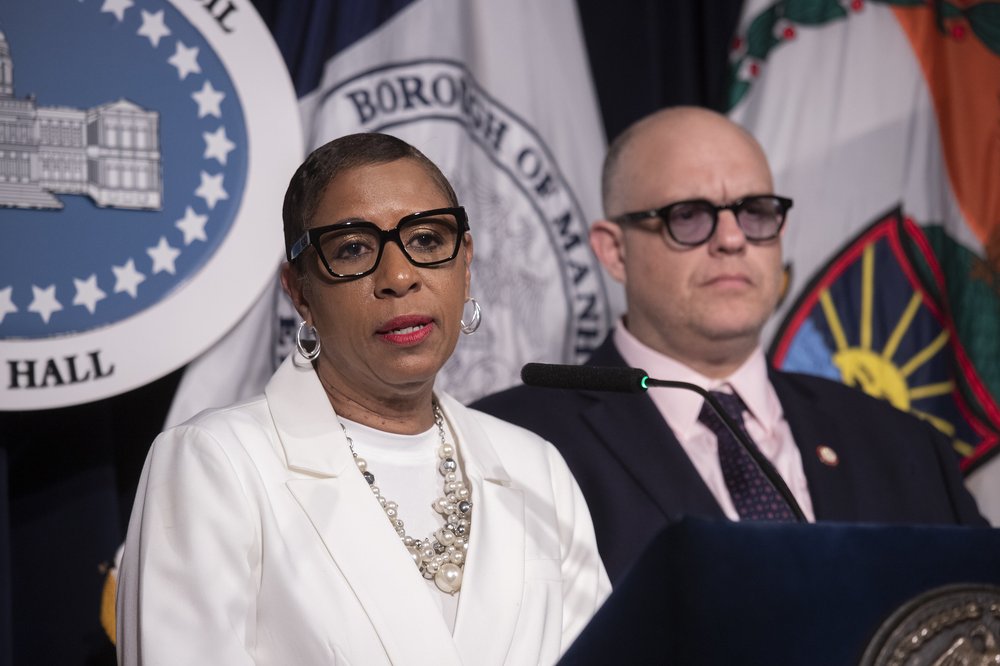NYC Council launches effort to expand approval power over Mayor Adams' commissioners
May 23, 2024, 4:18 p.m.
Speaker Adrienne Adams on Thursday introduced legislation that would give the Council say on 21 commissioner appointments.

New York City Council Speaker Adrienne Adams is pushing for more approval power over the mayor's administration.
City Council Speaker Adrienne Adams introduced legislation on Thursday that would give the Council approval over the mayor’s appointment of 21 key commissioners — a move that could dramatically alter the balance of power at City Hall.
“It’s about good government and effective governing,” the speaker told reporters during a City Hall press conference on Thursday. “We think it's an important conversation to have. Commissioners serve the city and all New Yorkers, not a single official, just like all of us do.”
The plan sets up yet another battle between the speaker and Mayor Eric Adams, who have clashed on budgets and legislation around public safety and affordable housing. The speaker — who has led the Council to successfully override both of the mayor’s vetoes in her tenure — said she has long been interested in pursuing such legislation and that it was not about the current mayor.
Nonetheless, her bid to change the appointment process represents the most aggressive move yet to rein in the power of a mayor who has come under increasing criticism over key decisions, including budget cuts, the migrant crisis and the people he has chosen to lead his administration.
While the Council has historically had limited power in comparison to the mayor, many federal and state governments commonly have a say in key appointments. The speaker argued that the change would provide more transparency and vetting of appointments that can become subject to political patronage.
As it currently stands, the proposal applies to only about a quarter of more than 80 agency heads who help run the city and would not affect current commissioners. Among the appointments the bill seeks to bring under the Council’s purview are the heads of sanitation, parks, transportation, health and emergency management.
Mayor Eric Adams was asked about the proposal Tuesday and said he did not agree with it, but would discuss it with the Council.
"Our system of governance is important. It brings balance. It brings conversation. I have not had a conversation with the speaker about it yet to see what's the whole depth of the bill," he said. "We have a strong executive system in New York, unlike others. I like that executive system because people should know who they blame if the streets are not clean, if the commissioners are not delivering."
Most recently, the mayor faced backlash over his push to appoint Randy Mastro — a controversial lawyer with a track record of conservative causes — as the city’s corporation counsel. That role is among the dozen or so appointments over which the Council currently has “advise and consent” authority. The mayor has yet to formally nominate Mastro.
The political chess match has already begun. Adams on Tuesday formed a Charter Revision Commission that could stall the effort, although his aides claimed the timing was unrelated to the speaker’s bill. Since the speaker’s proposal seeks to alter the functions of government branches, it must go before a citywide vote as a ballot referendum. The Charter Revision Commission, whose members the mayor has already appointed, could potentially delay the Council’s plan by putting its own ballot initiative forward instead.
In another possible twist, the Council has the power to form its own Charter Revision Commission, a move that could produce two dueling commissions. In 2018, the Council created a second Charter Revision Commission after its members expressed dissatisfaction with the scope of the commission created by then-Mayor Bill de Blasio.
It is unclear how long the mayor can stymie the Council from putting its proposal on a citywide ballot. Joseph Viteritti, a political scientist at Hunter College who was involved with the 1989 Charter Revision Commission, said he believed that a version of the Council’s proposal would have to go before voters at some point.
“That doesn’t bode well for a mayor whose popularity is low and who’s facing an investigation,” Viteritti said, referring to the mayor’s poor polling and an ongoing federal probe into his fundraising.
The speaker said on Thursday that she had no immediate plans to challenge the mayor’s sudden formation of a Charter Revision Commission, but she opened the door to a possible fight over its decisions.
“If it's a commission that is going to be focused on retribution … then we're looking at something totally different,” she said. “And quite frankly, I would hope that that would not be the case in spite of the rumblings that we've heard.”
This story has been updated with comment from the mayor.
How NYC Mayor Eric Adams lost a major bill battle and alienated key allies Mayor Adams sued over refusal to expand housing subsidies for poor New Yorkers